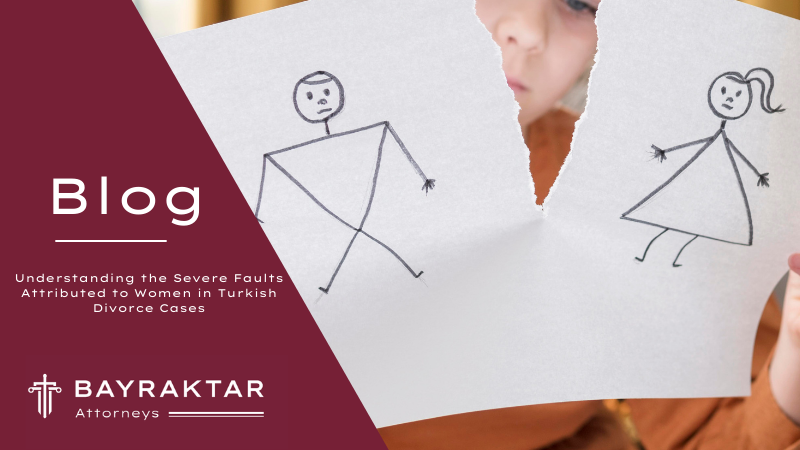
When it comes to divorce proceedings in Turkey, the concept of severe fault plays a pivotal role in the outcome of the case.
Known in Turkish as “boşanmada kadının ağır kusurlar nelerdir” or “what are the severe faults attributed to women in divorce”, this aspect of family law can significantly impact not only the dissolution of marriage but also the subsequent rights and obligations of the parties involved.
Navigating the intricacies of severe faults in Turkish divorce cases is crucial, especially for foreigners who may not be as familiar with the legal framework and cultural nuances.
Related: Registering and recognizing foreign divorce decisions
Legal Framework of Fault in Turkish Divorces
Under Turkish law, divorce can be granted on the basis of fault or no-fault grounds. Fault-based divorce requires one party to prove that the other has committed an act severe enough to render the marriage intolerable.
This is where understanding the specific actions that constitute severe faults becomes essential. The Turkish Civil Code outlines various actions that can be considered when examining a woman’s conduct in the context of a fault-based divorce petition.
Examples of Severe Faults
Severe faults are behaviors that breach the marital union’s basic principles, including, but not limited to, adultery, domestic violence, and abandonment.
Adultery is one of the most commonly cited grounds for fault-based divorce and is usually supported by substantial evidence.
Domestic violence, encompassing both physical and psychological abuse, is also a significant factor that the court may consider a severe fault, impacting the divorce decree and associated rulings such as custody and alimony.
The Role of Evidence and Proof
Gathering and presenting compelling evidence is key to proving severe faults in a divorce case. Documentation such as text messages, witness statements, and medical reports can be used to establish the existence of severe faults.
It is a sensitive process, and the privacy of the individuals involved often sits at the crux of legal proceedings. Thus, hiring an experienced attorney who understands the cultural and legal landscape is critical for effectively navigating this complex terrain.
Cultural Sensitivity and Legal Implications
While Turkish law aims to be fair and just, it is important to recognize that cultural perceptions occasionally influence the interpretation of what constitutes a ‘severe fault.’
Representing women in divorce cases requires not only a deep understanding of the legal definitions but also a nuanced approach to how societal norms might affect the legal arguments and the court’s decision.
Therefore, it is imperative for legal professionals and foreigners in Turkey to work with knowledgeable attorneys specialized in Turkish family law to accurately present their case and protect their legal rights.
Understanding the grave implications of severe faults attributed to women in Turkish divorce cases can be the determining factor in achieving a fair legal outcome.
While the law provides a clear framework, its application is deeply nuanced, necessitating professional advice and representation for those embroiled in such a challenging and personal legal battle.
Contact us at Bayraktar Attorneys if you’re facing a divorce case in Turkey involving severe faults attributed to women.
Our team of experienced family law attorneys specializes in navigating the complexities of Turkish divorce proceedings and can provide expert guidance and representation tailored to your specific situation.
We understand the cultural nuances and legal intricacies involved in these cases and will work diligently to protect your rights and achieve a fair outcome.
Don’t navigate this challenging legal landscape alone – let us help you navigate through this difficult time with compassion and expertise. Contact us today to schedule a consultation and learn how we can assist you.







